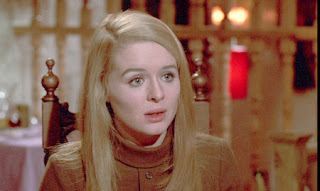Directed by Alvin Rakoff; produced by Ben Arbeid
A young woman, Janet Smith (Sinead Cusack), arrives at the home of
older businessman Benjamin Hoffman (Peter Sellers), with whom she works but
hardly knows. She comes under a threat: her boyfriend, Tom Mitchell (Jeremy
Bulloch), has been stealing from their mutual employer, and Hoffman threatens
to turn him in if Janet doesn’t spend a week with him. Fearing the worst, Janet
is a most reluctant guest, though Hoffman may not be what she thinks he is - and may not be what he himself thinks
he is.
A couple of weeks ago, I reviewed Monsieur Verdoux, a movie many
found off-putting because of its subject matter and the incongruity of its star,
famous for comedy, being in such a film. Hoffman
is in the same category, and suffered similarly. Hoffman did not do well when it was released. Since the star is
Peter Sellers, many people assumed at the time that it was a comedy; after all,
Sellers had made his name as a funny-man - on radio, as well as in the cinema -
and some of his films were downright farces. A violent film noir that he was in
ten years before, Never Let Go, was
not well received, and Sellers was given mixed reviews for it. Like that film, Hoffman is not a comedy. It’s a drama,
with some comedic touches. This undoubtedly disappointed many people.
As well, there was Sellers’s own reaction to it. Initially, he
tried to buy the negatives of the film - perhaps intending to destroy them -
and, so he claimed, start the movie over again. When his request was not
unreasonably refused, he began criticising Hoffman
in interviews. Not a few think his behaviour stemmed from the character he
plays being so close to how he really was. The actor, renowned for burying
himself in other personalities, was, the theory goes, afraid of people seeing
the real man, or afraid he would be interpreted badly.
Indeed, a bare synopsis makes the plot sound sinister, though it is, in fact, a version of Beauty and the Beast. Hoffman, though, can be very off-putting at first. Janet accuses the eponymous character outright of disliking women, regardless of his seemingly lascivious intentions toward her. Some of what Hoffman says is very derogatory toward females, and probably could not be publicly recited today. Yet Benjamin Hoffman is not the man he appears to be. A hint of this is heard very early on when he exhorts himself not to have any pity for Janet’s predicament. Why would he mutter this demand if he did not already have pity within him?
Hoffman is excellently written and acted. The character of Hoffman is an intensely lonely man whose aims in trapping Janet in his clutches are very different from what she thinks. Life has reinforced what was probably a low self-opinion to begin with, and the story is the result of the only solution he can see to his sad and desperate situation.
Janet is not a passive victim in the man’s pitiful plot. She begins as such, but soon grows to know more about Hoffman than he would like, and asserts herself in surprising ways. The tables don’t turn so much as are given two place settings, instead of the original one. Cusack manages, easily it seems, to convey both innocence and sexiness in a character who, previously, probably hadn’t given much thought to either.
One might think that, if this is the true Peter Sellers, then that man’s acting would not have been required to be of a high calibre. Yet, for a man at home in someone else’s skin, portraying a real human, realistically, without hilarity, must have been a challenge. Right from the start, he gives clues as to what is going on in Hoffman’s head, when he can barely speak, seeing Janet at his door, and when he must force himself to act suave in front of her. The result is an increasingly but never entirely sympathetic character trying in his own untutored manner to win over a hostile heart (similar, in some ways, to the story in As Good As It Gets (1997)).
Hoffman is
so damaged that he has erected a façade of contempt, and cannot express his feelings
except through craft and artifice. Should the audience hate him for his at
times disturbing views, or should they pity him, because he’s never been able
to see how things could be? This is the dilemma that the film wisely allows
viewers to decide for themselves.
Perhaps the best work that Sellers ever did – after all, it seemed pretty easy for him to conjure up comedy – and a less noticeable but very strong performance by Cusack, combine with fine writing to make Hoffman a film certain to generate forceful opinions.









I've never heard of this movie before. It sounds interesting, if rather disturbing. I know Sellers was a talented actor, but I've never been able to watch him because I sensed he was a very troubled person. (And apparently I was quite correct.)
ReplyDeleteI found the movie rewarding. I like and admire - though I don't always enjoy - films the characters of which are multi-layered. Many would dismiss Hoffman as a misogynist, but he's really a sheep in wolf's clothing. And, yes, I think Sellers had many problems; perhaps his greatest is that he hated himself, for whatever reason, and tried his best to avoid himself at every opportunity. Performing allowed that to happen.
Delete